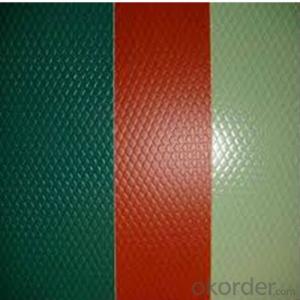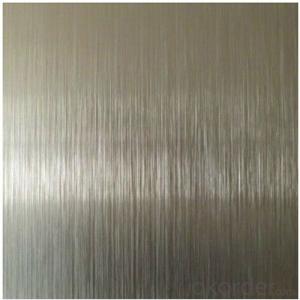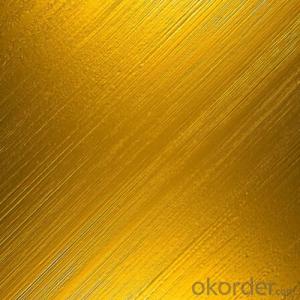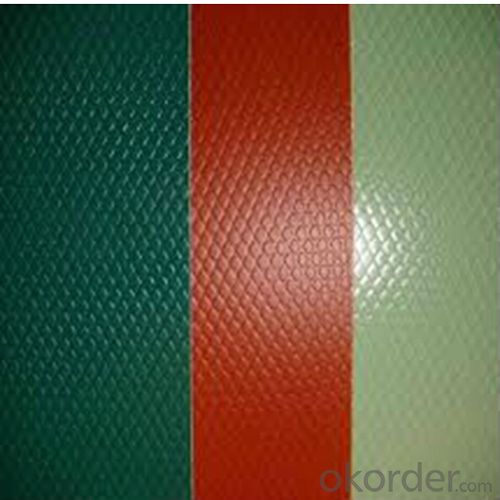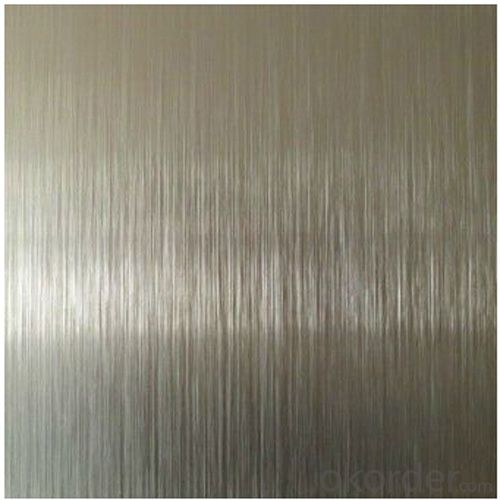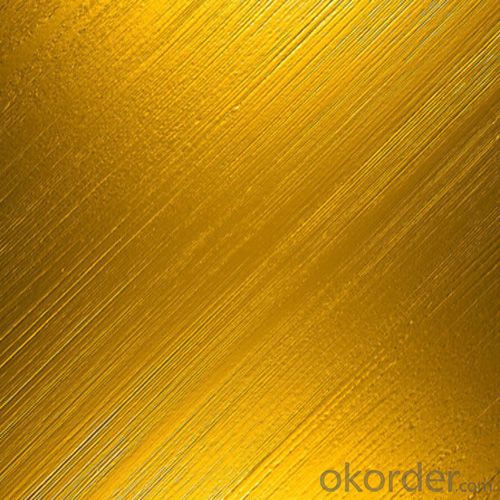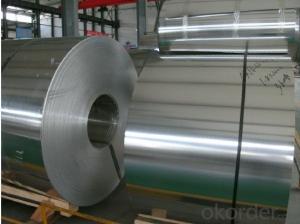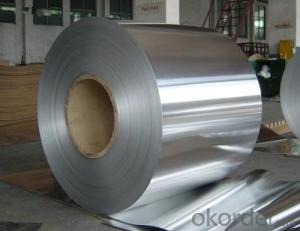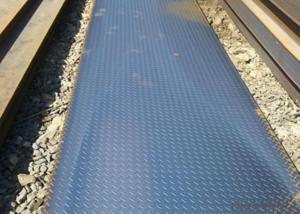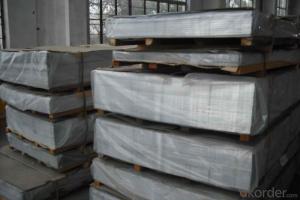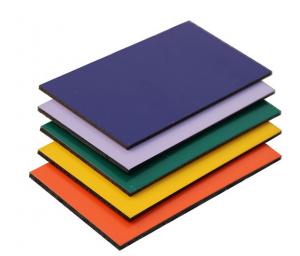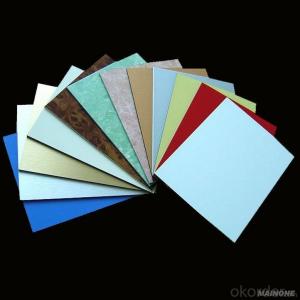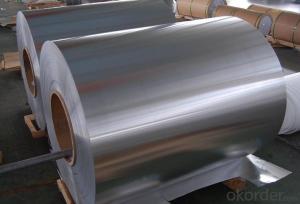Gpc143041 All Aluminum Coil Aluminium Composite Panel ACP Sheet with Best Price
- Loading Port:
- Shanghai
- Payment Terms:
- TT OR LC
- Min Order Qty:
- 5 m.t
- Supply Capability:
- 10000 m.t/month
OKorder Service Pledge
OKorder Financial Service
You Might Also Like
Specification
1.Structure of Aluminium Composite Panel ACP Sheet Description:
The substrates of composite materials are sheets, strips and foils of aluminum alloy. The raw material is aluminum sheet, strip, and foil. One side compund 50-200um special polymer materials, such as Polysurlyn; the other side is coated with 5-15um epoxy or polyester or fluorocarbon coatings. The back side coating is always the protective paint, and the obverse side can compound another PE protective coating.It's non-Heat treatable aluminum alloy with good corrosion resistance, good machinability, good electric arc welding performance,beautiful surface after anodic treatment.Commonly used in aviation,shipping field,also extensive used in the conventional industry,such as cars,planes,welding pieces,Metro and light rail,need strict fireproof pressure vessel,such as liquid tankers,refrigerated trucks, refrigerated container,refrigeration equipment,television tower,drilling equipment,transportation equipment,missile parts,armor,etc.
2.Main Features of Aluminium Composite Panel ACP Sheet :
Good Corrosion Resistance
Good Machinability
High Quality
Competitive Price
3. Aluminium Composite Panel ACP Sheet Images:
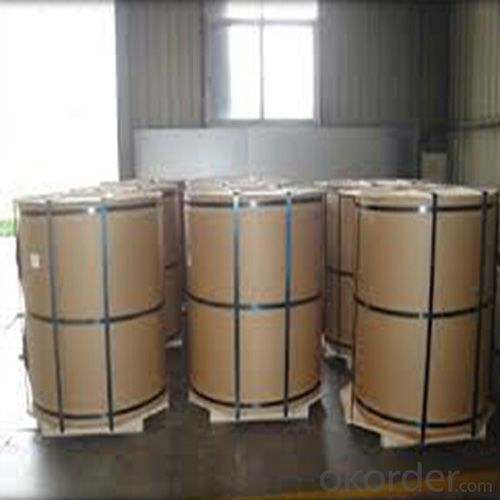
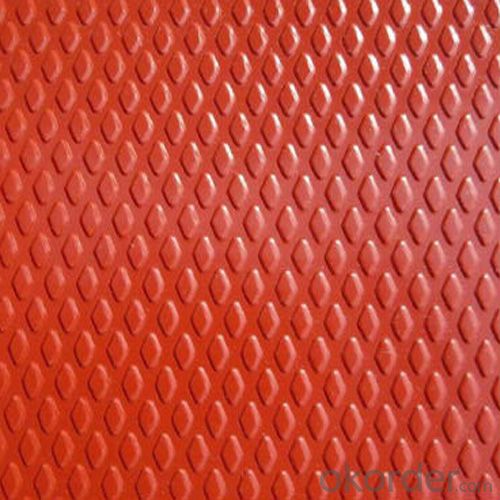
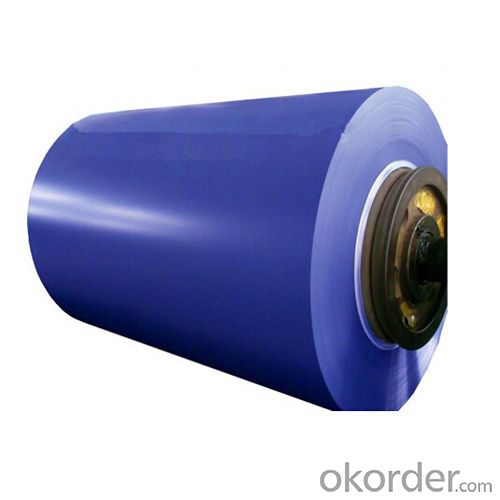
4. Aluminium Composite Panel ACP Sheet Specification:
Product Name | Thickness | Width(mm) | Length(mm) | Application |
Aluminium Coil | 0.1-6.0mm | 15-1500 | - | Aerospace, mould, instruments and meters, chemical industry, construction, packaging, anti-corrosion,insulation, air conditioning and other industries. |
Aluminium Sheet | 0.1-6.0mm | 100-2000 | 100-6000 | Solar energy, refrigerators, transport, electronics, electrical appliances, curtain wall, logos, signs and other industries. |
Aluminium Checkered Sheet | 0.3-3.0mm | Max.1200 | customized | Solar energy, water heaters, refrigerators, freezers |
Aluminium Corrugated Sheet | 0.3-3.0mm | 820-1067 | customized | Thermal power plants, chemical plants such as anti-corrosion,insulation |
Cable Foil/Coil | 0.2-0.7mm | 15-1500 | - | Wire and cable manufacturing industry |
Insulation Aluminium Coil | 0.5-3.0mm | 15-1500 | - | Desulfurization, car outside cover, wall body and roof cover. |
Air Conditioner Foil | 0.08-0.20mm | 15-1500 | - | Air conditioners, refrigerators, freezers and other radiator fin stock. |
Hydrophilic Foil | 0.08-0.20mm | 15-1000 | - | Air conditioners, refrigerators, freezers and other radiator fin stock. |
PS Sheet (aluminium Coil) | 0.3-1.0mm | 15-1500 | - | Graphic Arts |
Curtain Wall Panel (Aluminium Sheet) | 0.6-3.0mm | 100-2000 | 100-6000 | Building decoration, construction decoration |
Non-slip Aluminium Sheet | 1.0-6.0mm | Max.1200 | customized | Cars, ships, machinery and others devices. |
5.FAQ
Q1.How long have you been in this product?
A1:More than 10 years.
Q2. What's the minium quantity(MOQ)?
A2. 5 Metric tons
Q3. How long is shipping time?
A3. 7 (ready-made products)-25 days(OEM)
Q4. How do you guarantee the quality?
A4. 1. Cooperating and Exchaning experience with sevral quoted aluminum companies
2. Japanese and Swiss production line and skilled works (regular training and testing)
3. more than 10 years production experience.
Q5. Do you have after sale service?
A5. Yes. Any quality problem occurs within one year, pls take photoes,we will be responsible.
- Q: I had a small exclusive group of friends in high school of nine people. For Christmas every year we'd have a get-together and exchange gifts. Now, I was never fond of the, He got something different! or, Why did she get a book and I got a scarf? So I would always give my friends each the same thing, but personalized for them.One year I made aluminum foil sculptures for them because I was especially poor...And they loved them! They ranged from a dragon, an elephant, a pacifier, to a tiny martini glass. I was really surprised that everyone liked them.So do you think that I could make these and sell them at craft fairs? I don't know...it's just something I've been thinking about recently and wondering if it would work.
- It would have to be something they could not make by themselves. It would have to be durable. It would also help if the sculpture is useful in some way. Hey, I am just telling you what sells, from long experience. Maybe you would like to teach a class in foil sculpture instead. Try offering a class on Craigslist and see if anyone signs up. Or you could do videos or a pamphlet and sell those on Ebay. .
- Q: What happened to the aluminum coil coming out of the annealing furnace?
- There is oil on the aluminum coil and the annealing time is too long.
- Q: What is the typical coefficient of thermal expansion for aluminum coils?
- The typical coefficient of thermal expansion for aluminum coils is around 23.6 x 10^-6 per degree Celsius.
- Q: What are the different types of alloys used for aluminum coils?
- Aluminum coils are commonly made using several different types of alloys. The most frequently used alloy for aluminum coils is 3003, which is known for its excellent corrosion resistance and moderate strength. It finds its application in roofing and siding where high strength is not a requirement. 5052 is another alloy that is commonly used for aluminum coils. This alloy possesses good weldability and formability, making it suitable for a wide range of uses. In the automotive industry, it is often employed for body panels and fuel tanks. 6061 is a popular choice for aluminum coils due to its outstanding strength. It is frequently used in structural applications, such as aircraft parts in the aerospace industry and structural components in the construction industry. Additionally, other alloys like 1100, 5005, and 8011 are also used for aluminum coils. Each of these alloys has distinct properties and characteristics that make them suitable for different applications. For instance, 1100 is known for its high electrical conductivity and is commonly used in electrical applications. On the other hand, 8011 is frequently utilized for packaging and food containers due to its excellent corrosion resistance. In conclusion, the various alloys used for aluminum coils include 3003, 5052, 6061, 1100, 5005, and 8011. These alloys possess different properties and characteristics, making them suitable for a wide range of applications across industries like automotive, aerospace, construction, and packaging.
- Q: Can aluminum coils be used in the production of cans?
- Indeed, the utilization of aluminum coils is applicable in the manufacturing of cans. This versatile material, known for its exceptional attributes like its lightweight nature, durability, and ability to resist corrosion, finds extensive employment in the can-making industry. Typically, during the production procedure, aluminum coils are shaped into sheets and subsequently trimmed to achieve the desired dimensions and contours of the can. These sheets are then treated with coatings, printed upon, and processed into cans using a variety of techniques. Employing aluminum coils guarantees the creation of first-rate cans that are well-suited for packaging a wide range of beverages and food items.
- Q: Can aluminum coils be used in automotive applications?
- Yes, aluminum coils can be used in automotive applications. Aluminum is a lightweight and corrosion-resistant material, making it a suitable choice for various automotive components, including coils. Its high thermal conductivity also allows for efficient heat transfer, making it beneficial for applications such as radiators and air conditioning systems.
- Q: What are the different thicknesses available for aluminum coils?
- To meet different application needs, aluminum coils come in various thicknesses. The available options typically span from 0.2mm to 6mm. The thickness required depends on the intended use of the coil. For applications that prioritize flexibility and lightweight properties, thinner coils ranging from 0.2mm to 1mm are commonly used in electronics, packaging, and building materials. Medium thickness coils, ranging from 1mm to 3mm, find frequent use in automotive parts, roofing, and cladding applications. Conversely, heavier-duty industrial applications like shipbuilding, aerospace, and construction utilize thicker aluminum coils, measuring 3mm to 6mm in thickness. To determine the most suitable thickness for a given application, it is crucial to consider the specific requirements and intended use of the aluminum coil.
- Q: Aluminum roll, which companies are used?
- Too many things that you can see every day, with all the things that are made of aluminum, and the companies that make these aluminum products are useful, so it's unclear!
- Q: How do aluminum coils perform under low-temperature applications?
- Aluminum coils generally perform well under low-temperature applications due to the metal's high thermal conductivity and excellent resistance to low temperatures. This allows the coils to efficiently transfer and distribute heat, making them suitable for various cooling and refrigeration systems. Additionally, aluminum's natural corrosion resistance helps maintain the coils' performance and durability in low-temperature environments.
- Q: How do you store and transport aluminum coils?
- To ensure the safety and prevent damage of aluminum coils, various methods are typically employed for their storage and transportation. When it comes to storage, it is crucial to keep the coils in a dry, clean, and well-ventilated area, thereby avoiding any moisture-related problems or corrosion. It is also ideal to maintain a controlled temperature in the storage area to prevent any drastic fluctuations that could impact the quality of the aluminum. In order to safeguard the coils from physical harm, they should be stored horizontally or vertically on a stable and level surface. It is important to avoid excessive stacking, as this could lead to potential collapse and hinder easy access for inspection or transportation purposes. Additionally, placing the coils on wooden pallets or racks with appropriate spacing between each coil can offer additional stability and protection. When it comes to transporting aluminum coils, the options available depend on factors such as quantity, distance, and mode of transportation. For short distances or smaller quantities, hand trucks or forklifts can be utilized to move the coils onto a flatbed truck or van. It is crucial to properly secure the coils using straps or bands to prevent any movement during transit. For larger quantities or longer distances, specialized coil carriers can be employed for transportation. These carriers are specifically designed to securely hold multiple coils in an organized manner, thereby minimizing any potential damage caused by vibration or shifting during transportation. They typically feature side rails and restraining bars to ensure the coils remain secure. Irrespective of the chosen transportation method, it is vital to handle the aluminum coils with care and ensure they are adequately protected. Regular inspections should be conducted before, during, and after transportation to identify any signs of damage or issues that could compromise the integrity of the coils. By adhering to these guidelines, the storage and transportation of aluminum coils can be carried out efficiently and safely.
Send your message to us
Gpc143041 All Aluminum Coil Aluminium Composite Panel ACP Sheet with Best Price
- Loading Port:
- Shanghai
- Payment Terms:
- TT OR LC
- Min Order Qty:
- 5 m.t
- Supply Capability:
- 10000 m.t/month
OKorder Service Pledge
OKorder Financial Service
Similar products
Hot products
Hot Searches
Related keywords
